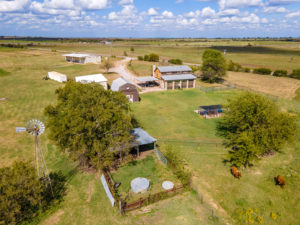Interested in buying or selling land now or in the near future?
Here is a great guide to agricultural land ownership laws in Texas. Click below to view guide.
https://agrilifecdn.tamu.edu/texasaglaw/files/2019/05/Owning-Your-Piece-of-Texas.pdf
The Preferred way to buy & sell real estate for you
Interested in buying or selling land now or in the near future?
Here is a great guide to agricultural land ownership laws in Texas. Click below to view guide.
https://agrilifecdn.tamu.edu/texasaglaw/files/2019/05/Owning-Your-Piece-of-Texas.pdf
Closing costs refer to a range of fees utilized to finalize a property transaction. These are additional costs paid on top of the purchase price, and for most buyers, wind up adding tens of thousands –or even tens of thousands–of dollars on the first spend. Because of this, it is crucial to factor in closing costs when deciding if a piece of land is based on what you can afford.
There are an assortment of different cost factors included in property closing costs. They may change based on how you fund your property buy and that you use to finalize the price, but these are the costs you will need to think about as you figure out how much a parcel of land may run you.
• Escrow fees — In addition to paying escrow itself, additionally, there are escrow fees, such as fees to hold funds and ease the transaction.
• Bank fees — If you take a loan out for your property, expect to cover origination charges, processing fees, credit report fees, and application fees, among other potential relevant costs.
• Transfer taxes — You will find taxation involved in transferring land from 1 owner to another (typically a set percentage of the transfer cost ), with the specific speed depending on what state you are purchasing.
• Recording fees — These are fees for drafting and documenting the property sale in public documents.
• Agent and attorney fees — Commission charges for both the buyer and seller’s broker, and any relevant attorney fees.
• Other third party charges — Plan having additional closing costs for paying appraisers, surveyors, inspectors, and anyone else whose services that you use to shut your buy.
In many land sales, it is the buyer’s duty to pay closing costs. That said, a few buyers can arrange to divide closing costs with the seller–or perhaps have the seller pay for all of them. The better price you are offering from the start, the better chance you have of alleviating some of the final cost burden, since a seller might be prepared to cover some or all of the costs if it means a shorter closing period or a cash buy.
Closing costs for land is negotiable just like everything else in real estate. Who pays, how much they pay, and if things become paid out are all things that you may have the ability to negotiate on your favor, although there are never any guarantees.
 A beautiful mural for a child’s bedroom. A handmade gazebo for early summer nights. An elaborate and well-maintained garden. Buyers and sellers may highly value these additions, but appraisers will not.
A beautiful mural for a child’s bedroom. A handmade gazebo for early summer nights. An elaborate and well-maintained garden. Buyers and sellers may highly value these additions, but appraisers will not.
These cosmetic features do not raise a home’s appraised value, says David Morgan, a Dallas-Fort Worth area broker and Certified General Appraiser with 35 years of experience in residential and commercial real estate.
“As an appraiser, you’d look at homes that sold with a simple gazebo and ones that sold without, and chances are there’s not any difference in the sales price,” he says.
Site improvements, such as an accessory dwelling unit or an outdoor living area with kitchen, can add value. Clients should not expect a dollar-for-dollar return on their investment, Morgan warns.
“I’ve seen people put in a $50,000 outdoor living area in a $200,000 neighborhood and expect to get $50,000 more when they go to sell it, and it’s not there. It’s an over-improvement. You paid more for it than the market will recognize in the value increase,” he says.
Swimming pools are the classic example of an over-improvement, Morgan says. “You put in a $60,000 pool in a $300,000 neighborhood and it increases the value maybe $20,000 or $25,000.”
The market value of these improvements matters because deals can be at risk if the property is appraised below the asking price. Depending on the contract, the buyer can back out of the deal or negotiate a different price. Buyers can also find another lender and appraiser, which Morgan says is not uncommon.
That said, not all site improvements or cosmetic updates add value, but most add marketability, Morgan says. “That means it makes it easier to sell because buyers like it, which usually results in less time on the market. However, it’s wiser to remodel or update kitchens and bathrooms than build a gazebo or a fancy mural. That’s where real value is added,” he says.
https://www.texasrealestate.com/members/posts/how-improvements-affect-value/
 What You Need to Know When Selling a Farm or Ranch
What You Need to Know When Selling a Farm or RanchIf you are considering selling a farm or ranch, there are important tax and financial planning issues of which you need to be aware. a sale can involve significant income tax consequences and important estate planning considerations. advanced planning prior to a sale is critical to preserve the value of your property and to ensure a secure financial future for you and your family.
To read more click on link:
 Property taxes apply to all property investments, irrespective of whether you’re living on the land, building on it, or earning an income from it. Meaning that if you own vacant land, you are going to need to pay property taxes on it though you can also be qualified for some fairly decent deductions.
Property taxes apply to all property investments, irrespective of whether you’re living on the land, building on it, or earning an income from it. Meaning that if you own vacant land, you are going to need to pay property taxes on it though you can also be qualified for some fairly decent deductions.
Property taxes are calculated on vacant land, the amount of property taxes that you owe on vacant land are calculated from your county tax assessor and are generally based on the “highest and best use” potential of the plot–i.e. its most rewarding use. Nevertheless, you can anticipate the amount you’ll spend for vacant land is a lot less than the quantity you’d owe for enhanced land.
Based on where you live, you might have state-specific rules that govern land taxes on vacant property and just how much they can increase every year. In California, for example, Proposition 13 dictates that the assessed value of your empty land cannot go up by more than 2 percent in any given year, regardless of other changes which might have impacted its usage and profit potential.
Imagine if you disagree with the appraised value of your land? It’s not unusual for property owners to locate themselves facing higher property taxes than they anticipated. As a good guideline, it’s always a fantastic idea to examine the real estate tax history of a plot of property before buying it so that you can find a heads up on what you’re in for. But should you purchase vacant land and think the assessed value is too high–or if you believe it’s gone up a lot in the past year–then you’ve got some potential recourse.
To appeal your property tax assessment, start by digging to the data. Pull up your property’s record card and search for discrepancies in the description of your land, since if they exist you should have no trouble obtaining a fast adjustment. If that does not work, look to the comps and your land itself to make a case for why the appraised value is too high. You can then take this information to your county, where you’ll go through a formal appeal procedure.
Be aware you will probably face limitations on when you can appeal your vacant property taxes. As an example, expect that you won’t have the ability to place an appeal before a new assessment comes out after buying, which from that you might have between 30 and 90 days to launch your circumstance.
Vacant land tax deductions, on the bright side, as a property investor you are qualified to write off certain expenses related to owning your vacant property, and that includes your property taxes. You might also write off the interest that you pay in your own land loan. Both of these expenses will proceed in your Schedule A tax type, which insures personal itemized deductions.
Keep in mind that under the Tax Cuts and Jobs Act (TCJA), certain deductions which are standard for investors of empty land–believe developments, maintenance fees, and legal and accounting charges –are no more workable write-offs unless you’re a land dealer purchasing land for a fast turnaround purchase.
Creating a place that’s relaxing and inviting can make balmy weekday evenings feel like a mini-vacation, especially when a barbecue or bonfire is involved. But using an at-home retreat also means taking steps to ensure that your backyard is secure and private, especially if there’s a pool or water feature involved.
Wood fence, they look elegant, offer fantastic privacy, and are simple to install. The drawback, of course, is upkeep and with our warm summers and brutal winters, a wood fencing will need regular staining or painting, a project which every homeowner dreads. On the flip side, should you prefer to upgrade the look of your backyard frequently, wood can be painted in any color possible and it is one of the most affordable choices on the market. A six-foot panel will probably operate around $25-$50 depending on the form of wood.
Composite fencing, consists of engineered timber, and while it mimics the expression of the organic substance, its lifespan is much more with very little upkeep requirements and no worry it will rust, splinter or warp. The price will vary based on the design and kind, but you can expect to pay $100-$150 per cent segment.
Chain link fence, might be a fantastic option for you. While they generally are not the most trendy concerning design, a chain-link fence will maintain your backyard protected and they are sometimes slightly customized in various colors and gauges. Should you need more privacy, you can update a chain-link fence with metal slats. On top of that, it is the cheapest of options, coming in at $100 or less for a 50-foot roll. If you prefer the concept of a metal fencing, but prefer something a bit more upscale, go for an aluminum alternative, which can be powder coated and needs very little maintenance. A six-foot panel will run you $50-$75 depending on the elevation.
Glass or Plexiglass panel fencing, is beautiful for a lawn with a opinion or to enclose a pool with no shutting out the remainder of your premises. Glass fences are lasting, but they do tend to scratch easily and need to be cleaned frequently. They are also generally the most expensive fencing alternative, especially if they need to enclose a large area or in-ground pool.